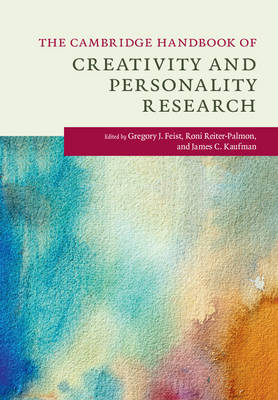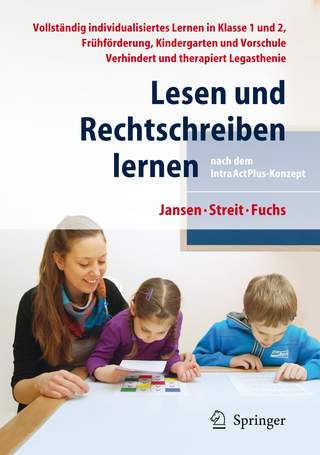
The Cambridge Handbook of Creativity and Personality Research
Cambridge University Press (Verlag)
978-1-107-10759-5 (ISBN)
As individual subjects, creativity and personality have been the focus of much research and many publications. This Cambridge Handbook is the first to bring together these two topics and explores how personality and behavior affects creativity. Contributors from around the globe present cutting-edge research about how personality traits and motives make creative behavior more likely. Many aspects of personality and behavior are examined in the chapters, including genius, emotions, psychopathology, entrepreneurship, and multiculturalism, to analyse the impact of these on creativity. The Cambridge Handbook of Creativity and Personality Research will be the definitive resource for researchers, students and academics who study psychology, personality, and creativity.
Gregory J. Feist is Professor of Psychology at San José State University, California and has published widely in creativity and the psychology of science. His book Psychology of Science and the Origins of the Scientific Mind (2006) was awarded the William James Book Prize by the American Psychological Association (APA). Roni Reiter-Palmon is the Varner Professor of Industrial/Organizational (I/O) Psychology and the Director of the I/O Psychology Graduate Program at the University of Nebraska, Omaha. Her research focuses on creativity and innovation in the workplace, cognitive processes, and individual difference variables that influence creative performance of individuals and teams. James C. Kaufman is Professor of Educational Psychology at the University of Connecticut. He has authored or edited more than thirty-five books and currently co-edits the International Journal of Creativity and Problem Solving. He has also authored over 200 academic papers.
1. Introduction. The personal side of creativity: individual differences and the creative process Gregory J. Feist, Roni Reiter-Palmon and James C. Kaufman; Part I. Process and Structure of the Creative Personality: 2. Openness/intellect: the core of the creative personality Victoria C. Oleynick, Colin De Young, Elizabeth Hyde, Scott Barry Kaufman, Roger Beaty and Paul Silvia; 3. Sweet dreams are made of this: the role of openness in creativity and brain networks Rex Jung and Christine Meadows; 4. The curious dynamic between openness and interests in creativity Sang Eun Woo, Melissa Keith, Rong Su, Rachel Saef and Scott Parrigon; 5. Personality, behavioral thresholds and the creative scientist Gregory J. Feist; 6. Creative self-concept: a surface characteristic of creative personality Maciek Karwowski and Izabela Labuda; 7. Where do diversifying experiences fit in the study of personality, creativity, and career success? Rodica Damian; 8. Rethinking the mutlicultural experiences-creativity link: the interactive perspective on environmental variability and dispositional plasticity Jen-Ho Chang, Jenny C. Su and Hsueh-Chih Chen; 9. An integrative approach to the creative personality: beyond the Big Five paradigm Guillaume Fürst and Todd Lubart; Part II. Creativity and Personality: Emotion, Motivation and Psychopathology: 10. Creativity and personality: nuances of domain and mood Christa Taylor, Alexander S. McKay and James C. Kaufman; 11. Emotions and creativity: from states to traits and emotion abilities Zorana Ivcevic and Jessica Hoffmann; 12. Innovation motivation: a social learning model of originality Stephen Joy; 13. Creative genius and psychopathology: creativity as positive and negative personality Dean Keith Simonton; 14. Personality traits, personality disorders and creativity Adrian Furnham; Part III. Creativity and Personality: Measurement and Social Influences: 15. Creativity and the Big Five personality traits: is the relationship dependent on the creativity measure? Jason Hornberg and Roni Reiter-Palmon; 16. What are funny people like? Exploring the crossroads in humor ability and openness to experience Emily C. Nusbaum and Paul Silvia; 17. Much more than selfies: autophotography, individuality, and creativity Stephen J. Dollinger; 18. Can teams have a creative personality? Rob Litchfield, Lucy Gilson and Christina Shalley; 19. The entrepreneurial personality: individual differences and social capital in work-related innovation Reece Akhtar, Gokran Ahmetoglu and Tomas Chamorro-Premuzic; 20. Effects of creativity training programs on individual characteristics Denise Fleith; 21. Creativity and personality research: themes and future directions Patricia O'Rourke, James C. Kaufman, Gregory J. Feist and Roni Reiter-Palmon.
| Erscheinungsdatum | 10.03.2017 |
|---|---|
| Reihe/Serie | Cambridge Handbooks in Psychology |
| Verlagsort | Cambridge |
| Sprache | englisch |
| Maße | 184 x 260 mm |
| Gewicht | 940 g |
| Themenwelt | Geisteswissenschaften ► Psychologie ► Pädagogische Psychologie |
| ISBN-10 | 1-107-10759-8 / 1107107598 |
| ISBN-13 | 978-1-107-10759-5 / 9781107107595 |
| Zustand | Neuware |
| Informationen gemäß Produktsicherheitsverordnung (GPSR) | |
| Haben Sie eine Frage zum Produkt? |
aus dem Bereich


